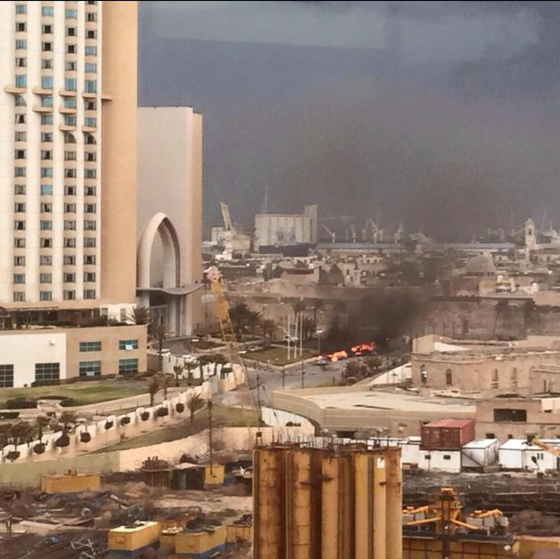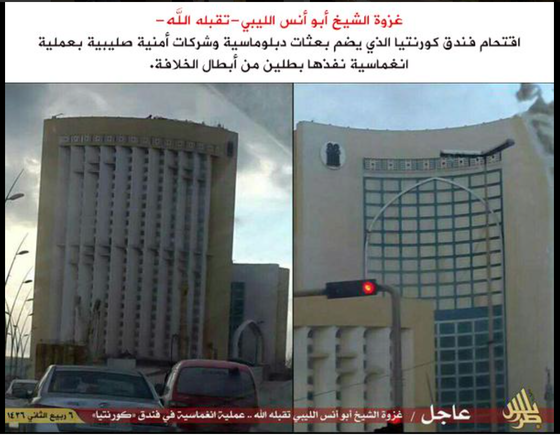Gunmen stormed the Corinthia hotel in Tripoli early this morning, killing at least five foreigners and three guards, according to initial reports. Foreign government officials, including those serving as diplomats, and tourists have frequented the hotel in the past, making it an attractive target for jihadists.
The terrorists responsible for the raid reportedly met resistance from security forces. As of this writing, however, the siege was not over.
The Associated Press reported that a car bomb was part of the attack. Images posted online show what appears to be an explosion outside of the hotel. Some of the photos have been published on Good Morning Libya, a Twitter feed that is run by supporters of General Khalifa Haftar, whose forces have been battling jihadists throughout Libya. One of the photos can be seen at the beginning of this article. Online jihadists are claiming that suicide bombers were used in the car bombing.
According to the SITE Intelligence Group, the Islamic State’s so-called “Tripoli Province” claimed responsibility for the attack in a short message that was posted on Twitter. The message stated that “heroes of the Caliphate” are responsible for the operation, which has been named the “Battle of Abu Anas al Libi.”
An image published online by the organization’s media operatives can be seen to the right.
Al Libi was a core al Qaeda operative who was captured in Tripoli in early October 2013 and subsequently held in the US for his role in al Qaeda’s bombings of US embassies in Kenya and Tanzania in August 1998. Al Libi passed away while awaiting trial earlier this year, and jihadists blame the US government for his death, even though he died of natural causes.
Al Libi’s capture in Tripoli by US forces was denounced by many in Libya. By naming the attack after al Libi, the Islamic State’s “Tripoli Province” is attempting to capitalize on the manufactured controversy surrounding his capture and death.
In some ways, the choice of name for the attack is ironic. The Islamic State’s “provinces” in Libya and elsewhere are part of emir Abu Bakr al Baghdadi’s attempt to build international support for his caliphate, and the Islamic State’s supporters are openly confrontational toward al Qaeda. Indeed, the Islamic State’s “provinces” are intended to draw support away from al Qaeda’s international network of official and unofficial branches.
However, al Libi was a loyal al Qaeda operative. Documents recovered in Osama bin Laden’s compound show that Al Libi was appointed to al Qaeda’s security committee after he was released from Iranian custody in 2010. He sought permission from al Qaeda’s most senior leaders before relocating to his native Libya. They granted al Libi’s request and he moved back to Libya in 2011.
An unclassified report published by the Library of Congress in August 2012 identified al Libi as a key player in al Qaeda’s strategy for building a fully operational network in Libya.









